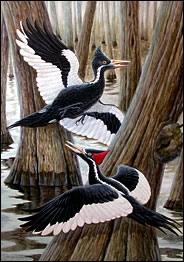The Ivory-Billed Woodpecker Lives
...at least one of them. An adult male has now been spotted on a couple of occasions. All involved hope they haven't just found a single lonely survivor.
 Regular folks might wonder at the level of excitement that ornithologists and bird watchers have about this. But this is not just any bird. Its most enduring nickname is Lord God Bird - as in "Lord God, what a bird!" It's huge.
Regular folks might wonder at the level of excitement that ornithologists and bird watchers have about this. But this is not just any bird. Its most enduring nickname is Lord God Bird - as in "Lord God, what a bird!" It's huge.
When I heard, "Scientists announced today that they have discovered a living..." The next words could have been "Big Foot" and it wouldn't have surprised me much more than "Ivory-Billed Woodpecker." How could a group of such large and showy birds have escaped detection for so long? One wonders whether we shouldn't be on the lookout for the passenger pigeon too.
The answer is probably a combination of factors:
- It's a very small group of birds,
- That survived in a different place from where people had last seen it, and
- The bird's love of big, old growth forests naturally drew it to a very remote place, and
- The UFO effect.
As a young teenager I took an overnight canoe trip down the White River. I've spent some time in the woods, but that trip was different. There was no sound of cars. I don't think I even saw an airplane fly over. The forests were big and dark. I'm sure there were times that my family and I were fifteen miles from the next person. It was the perfect place for a shy bird to hide.
But I think the UFO factor is a big part of how this bird stayed hidden. Respected scientists had stopped looking for the bird. If some doctoral candidate had submitted a thesis on the possibility of this bird surviving, he'd have been labeled a crank. Those who claimed to have seen the bird (there were many, surely some of these sightings will now prove to be authentic) simply weren't believed.
There is a lesson here. Scientists shouldn't, can't, and won't go chasing down every UFO or Loch Ness monster sighting. Scientists gravitate to those lines of inquiry most likely to prove fruitful and tend to ignore other areas. This makes sense. It's a form of habitat selection for bright minds.
But scientists shouldn't get cocky. The road not taken was probably a dead-end - but who's to say? White River might even hold more secrets.
UPDATE: NPR has aired two segments on this find (here and here).
Comments
Very exciting.
This is also encouraging for those of us who hope that one day the tasmanian tiger will be found to be less extinct than was thought.
Posted by: Phil Bowermaster![[TypeKey Profile Page]](http://www.blog.speculist.com/nav-commenters.gif) |
April 29, 2005 03:01 PM
|
April 29, 2005 03:01 PM